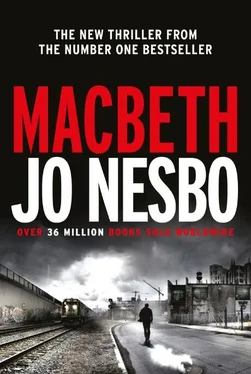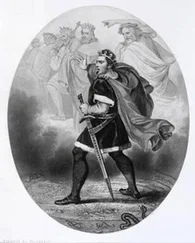‘She told me in no uncertain terms that I was not to say what she does in her sleep, sir.’
‘And what does she do?’
‘Sometimes she strolls up and down the corridor as you say. Otherwise she goes into the washroom and uses the strong soap there. Scrubs her hands, occasionally until her skin goes red. Then she comes up on the roof.’
Macbeth looked at her. His beloved Lady. So exposed and vulnerable out in the wind-blown night. So alone in the darkness of her mind, the darkness she had told him about but where she couldn’t take him. There was nothing he could do. Just wait and hope she would choose to come back in from the night. So near and so out of reach.
‘What makes you think she might take her life tonight?’
Jack glanced at Macbeth in surprise. ‘I don’t think she will, sir.’
‘So what was it then, Jack?’
‘What was what, sir?’
‘What made you so worried that you called me?’
At that moment the moonlight broke through a gap in the cloud. And as if at an agreed signal Lady turned and walked towards them.
‘That, sir.’
‘God help us,’ Macbeth whispered and hurriedly took a step back.
She was holding a bundle in her arms. She had pulled her nightdress to expose one breast, which she held to the open end of the bundle. Macbeth saw the back of a baby’s head. He counted four black holes in it.
‘Is she asleep?’ Macbeth asked.
‘I think so,’ Jack whispered.
They had followed her closely off the roof, down the stairs and into the suite. Now they were standing by her bed, where she lay with the blanket pulled up over her and the child.
‘Shall we take it off her?’
‘Let her keep it,’ Macbeth said. ‘What harm can it do? But I want you to sit here and watch over her tonight. I have an important radio interview early tomorrow morning and have to sleep, so just give me a key for another room.’
‘Of course,’ Jack said. ‘I’ll ring for someone to take over at reception.’
While Jack was away Macbeth stroked the baby’s cheek. Cold, stiff, a destroyed baby. What Lady and he had been. But they had managed to repair themselves. No. Lady had managed to repair herself. Macbeth had had help. From Banquo. And before that, at the orphanage, from Duff. Had Duff not killed Lorreal, Macbeth would probably have committed suicide sooner or later. Even when he escaped from the home he still had four black holes in his heart. Four holes that had to be filled with something. Brew was the quickest and easiest available sealant. But at least he kept himself alive. Thanks to Duff, the bastard.
And then there was Lady of course. Who had shown him that hearts can be sealed with love, and pain can be eased with love-making. He stroked her cheek. Warm. Soft.
Were there ways back or had they forgotten to plan for a possible retreat? Had they planned only for victories? Yes, and they’d had victories. But what if the victory leaves a bitter taste, what if it comes at too great a cost and you would prefer a cheap defeat? What do you do then? Do you abdicate, renounce the royal trappings, ask humbly for forgiveness and return to your daily chores? When you step off the edge of the roof, and the cobbles of the red-light district rush towards you, do you ask gravity if you can retrace your ill-considered step? No. You take what’s coming. Make the best of it. Make sure you land on your feet and perhaps break a leg or two. But you survive. And you become a better person who has learned to tread more carefully the next time.
Jack came in. ‘I’ve found someone for reception,’ he said and handed Macbeth a key.
Macbeth looked at it. ‘Duncan’s room?’
Jack put a hand to his mouth in horror. ‘I thought it was the best room, but you might prefer...’
‘That’s fine, Jack. I’m close by in case there is anything. Besides I don’t believe in ghosts. And as everyone knows I have nothing to fear from Duncan’s ghost.’
‘No, nothing.’
‘Indeed, nothing at all. Goodnight.’
They came as soon as he closed his eyes.
Duncan and Malcolm. They were lying under the duvet either side of him.
‘There isn’t room for us all,’ Macbeth screamed and kicked them out onto the floor, where they hissed until rat tails rustled alongside the wall and they were gone.
But then the door opened, and in crept Banquo, Fleance and Duff, each with a dagger in hand, poised ready to strike.
‘What do you want?’
‘Justice and our sleep back.’
‘Ha, ha, ha!’ Macbeth laughed, writhing in his bed. ‘The person who can hurt me hasn’t been born! Only Bertha can unseat me as chief commissioner! I am immortal! Macbeth is immortal! Out, you dead mortals!’
Fred Ziegler yawned.
‘Fred, you need a cup of coffee.’ The captain of MS Glamis chuckled. ‘We can’t have a harbour pilot falling asleep in this weather. Tell me, are you always tired?’
‘Busy days, not enough sleep,’ Fred said. He could hardly tell the captain the reason he was always yawning was that he was frightened. Fred had seen the same symptom in his dog, but fortunately yawning was usually regarded as indicating that you were totally at ease. Bored. Or, indeed, you hadn’t slept enough. The captain pressed the intercom, and his order for coffee went down the cable to the galley, deck after deck after deck. MS Glamis was a big ship. A tall ship. And that was what bothered Fred Ziegler.
He stifled another yawn and stared across the river. He knew every reef, every shallow and every tiny paragraph in the port authority rulebook about sailing into and out of the harbour — where the current flowed strong, where the waves broke, where you could lie in shelter and where every bollard on the quay was. That didn’t bother him. The river was grey; he could guide ships in and out blindfolded, and often had, or as good as. The weather didn’t bother him either. A near gale was blowing, and the glass in front of them was already white with spray and salt. But he had guided bigger and smaller ships in hurricanes and worse without needing a beacon, a spar buoy or a lookout. The trip in the little pilot boat that would take him ashore didn’t trouble him, even though it was as seaworthy as a cow — a fresh breeze and it took in water, the hint of a gale and it could turn round if the coxswain didn’t hit the waves right.
Fred Ziegler yawned because he dreaded the ship lowering the red and white flag that showed they had a pilot on board. Or to be more precise, having to leave the ship. Going down the rope ladder.
For twelve years he had worked as a pilot and still he hadn’t got used to going up and down the side of a ship. It didn’t bother him that he might end up in the drink, although he knew he ought to have been afraid because he couldn’t swim.
No, what bothered him was the height.
The paralysing fear when he would have to step out backwards from the ship’s side. Even in this weather the ship was so big that climbing down the ladder on the leeward side wasn’t difficult from a purely technical point of view. However, seeing or just knowing that there was fifteen metres of thin air between him and the abyss bothered him. It had always been like this and always would be. Every bloody working day was bound up with this minor hell: it was the first thing on his mind when he woke up in the morning and the last before he went to sleep. But what the heck, there was nothing unusual about it — all around him he saw people who lived their whole lives doing jobs or in positions they weren’t cut out for.
‘You must have come out of the harbour so many times now that you could ask the coastguard just to let you go,’ Fred said.
‘Let me go?’ the captain said. ‘I wouldn’t have your company then, Fred. What is it? Don’t you like me?’
Читать дальше












